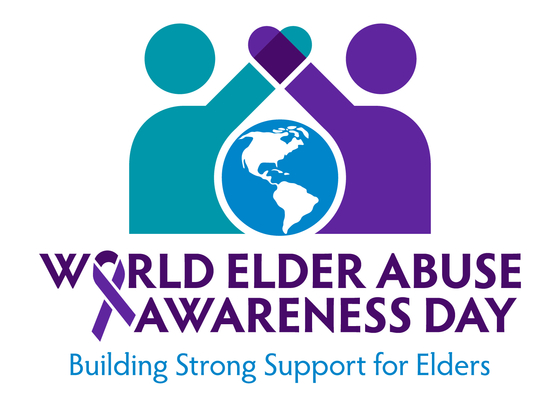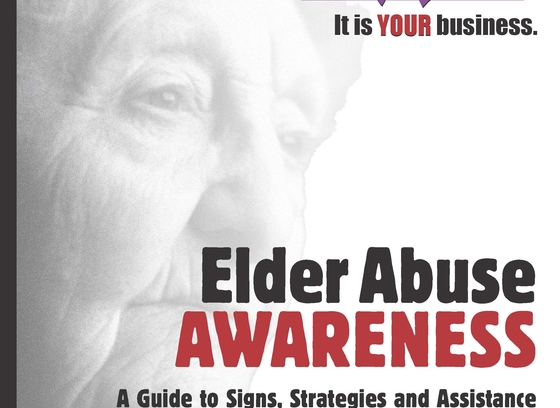World Elder Abuse Awareness Day is June 15
In 2022, the Howard County Office on Aging and Independence partnered with local, state and federal agencies to spread awareness and prevention strategies on elder abuse and neglect, and financial exploitation. To learn how you can recognize and report elder abuse, follow us on Facebook or view the Elder Abuse Awareness Guide and other information, below.

Elder Abuse Awareness Guide
A comprehensive educational guide including resource listings. Click here to view

NEW! Contact the National Elder Fraud Hotline for Help
If you or someone you know has been a victim of elder fraud, help is available from the National Elder Fraud Hotline, a new service created by the U.S. Department of Justice. Contact them at 1-833–FRAUD–11 or 1-833–372–8311 every day, from 6 a.m. to 11 p.m. (English/Español/other languages available). Visit the hotline website for more information.
Take a Stand Against Elder Abuse
Elder abuse affects hundreds of thousands of people each year, yet just one in fourteen cases is brought to the attention of authorities. Individuals suffering from cognitive impairment or Alzheimer's Disease are particularly vulnerable. Elder victims tend to be the most isolated of all victims of family violence; they are likely to have fewer social connections to the community that would normally be an avenue of help.
Here are some things you can do to help:
- Become informed - learn the types of abuse and how to recognize the different signs of abuse
- Report suspected abuse in nursing homes and assisted living facilities by contacting the Howard County Long Term Care Ombudsman Program at 410-313-6423 (voice/relay)
- Report suspected abuse in the community by contacting the Howard County Department of Human Services: Adult Protective Services at 410-872-8700 (voice/relay)
- Keep in contact with older relatives, friends and neighbors
- Volunteer with a program that provides assistance and support services to older adults
- Take a stand! The National Center on Elder Abuse (NCEA) urges individuals, families, community groups, organizations, and businesses to “Take A Stand” by participating in elder abuse awareness and prevention efforts.
- Learn how to spot the warning signs of abuse or mistreatment; the NCEA's reference guide, the Red Flags of Abuse can help (also available in Korean). Also, the Eldercare Locator, a public service of the U.S. Administration on Aging, has compiled a list of 10 Warning Signs an Older Loved One May Need Assistance to help older adults, family members, and caregivers recognize when extra help is needed in the home.
- Physical Abuse—Inflicting, or threatening to inflict, physical pain or injury on an elder person or vulnerable adult, or depriving them of a basic need.
- Emotional Abuse—Inflicting mental pain, anguish, or distress on an elder person or vulnerable adult through verbal or nonverbal acts.
- Sexual Abuse—Non-consensual sexual contact of any kind, coercing an elder person or vulnerable adult to witness sexual behaviors.
- Exploitation—Illegal taking, misuse, or concealment of funds, property, or assets of an elder person or vulnerable adult.
- Neglect—Refusal or failure by those responsible to provide food, shelter, health care or protection for an elder person or vulnerable adult.
- Abandonment—The desertion of a vulnerable elder by anyone who has assumed the responsibility for care or custody of that person.
Older adults in Howard County, as well as the rest of the United States, are often targets of scams and fraud, which are forms of financial abuse. The Howard County Office of Consumer Protection educates the public on how to avoid being a victim of a scam and prevent fraud, and also handles complaints against businesses. To find out more about these services, call 410-313-6420 (voice/relay) or email consumer@howardcountymd.gov.
The Maryland Department of Aging's attorney general has created the following guidelines as part of its Project SAFE.
Protect Week Resources for Financial Exploitation (www.protectweek.org)
During Protect Week, June 14-18, 2021, Marylanders will have an opportunity to learn about the many forms of abuse, neglect and financial exploitation of older adults via the resources of more than a dozen local and national partners including the Maryland Office of the Attorney General, Maryland Office of the Comptroller, Office of the Commissioner of Financial Regulation, Maryland Department of Aging, CCCSMD, AARP Maryland and AARP Fraud Watch Network, Maryland Department of Veterans Affairs, Maryland Volunteer Lawyers Service, EverSafe. For more information and resources, visit www.protectweek.org and the Maryland Consumer Rights Coalition.
Unfortunately, Medicare fraud offers new opportunities for con artists to steal money and personal information from unwary health care shoppers. Consumers need to be alert to offers of "help" that will instead damage their pocketbooks. Keep the following tips in mind to avoid becoming a victim of Medicare fraud.
- There are no "official" Medicare sales representatives. Private insurance companies sell Medigap and Medicare Advantage coverage plans. Insurance sellers cannot claim to be Medicare representatives, nor can they say they are endorsed by Medicare.
- Know who you are dealing with. If you decide to talk with an insurance agent, make sure the agent is licensed. Get the name and address of the agent and the insurance company and know how to contact them if you need help. Verify an agent's status by calling the Maryland Insurance Administration at 1-800-492-6116.
- Cold calling is prohibited. Private insurance agents cannot go door-to-door or call you at home, unless you've given them prior permission to do so. If you haven't requested the call, hang up. If you haven't requested a visit, don't invite them in.
- Resist pressure selling. If you decide to talk with an insurance agent, don't feel pressured to buy anything on the spot. If an agent tries to rush you, be suspicious! Tell the agent you need more time. Don't sign anything until you have read the document you are being asked to sign. Never sign a blank application form.
- Marketing is prohibited in places where health care is delivered and at educational events. Insurance agents cannot offer their products at doctors' offices, clinics, or pharmacy counters. While insurance agents can participate in educational events, they cannot directly enroll you in a plan at an event. If you meet an insurance agent at an event, don't sign a "request a contact form" unless you want someone to call you. Never provide personal information such as your Medicare number, Social Security number, bank account numbers, or credit card numbers.
- There is no such thing as a free lunch. Federal regulations prohibit offers of free meals for listening to a sales presentation or for signing up for a particular plan. Gifts can't have a value of more than $15.
- Overselling is prohibited. Insurance agents are prohibited from selling additional insurance products during a sales or marketing presentation of another. For example, if you request information on Medigap, an agent can't recommend a Medicare Advantage plan instead.
- Never pay with cash and always keep a record of what you buy. Always pay by check, money order, or credit card so you have a clear record of payment. Make checks payable only to the insurance company or insurance agency, not an individual agent. Insist on a receipt.
- Contact the experts. Howard County Office on Aging and Independence's State Health Insurance Assistance Program (SHIP) provides free, confidential and unbiased information by trained and certified counselors. Call SHIP at 410-313-7392 (voice/relay). If you have been approached by a salesperson who acted inappropriately or aggressively, or if you've been enrolled into an insurance plan against your will, call 1-800-MEDICARE and file a complaint. You can also file a grievance with the Maryland Insurance Administration at 1-800-492-6116 or contact SHIP at 410-313-7392.
Raising awareness about the types and signs of Elder Abuse is just the first step. The Office on Aging and Independence and Howard County Police urge citizens to "make a difference, make the call" by calling 9-1-1 to report suspected abuse or neglect. To learn more about local, state and national organizations involved in the protection of our most vulnerable citizens, click on one or more of the following links. To contact the Howard County Office on Aging and Independence for assistance, call 410-313-1234 (voice/relay) or email map@howardcountymd.gov.
In Howard County, contact:
- Howard County Office on Aging and Independence (Maryland Access Point), 410-313-1234 (voice/relay)
- Howard County Office of Consumer Protection 410-313-6420 (voice/relay)
- Howard County Police Department (www.hcpd.org), 9-1-1 or
- Howard County Sheriff's Office, cjadams@howardcountymd.gov or 410-313-2150, option “O”
- HopeWorks Howard County - formerly the Domestic Violence Center, 410-997-2272
- Howard County Department of Social Services: Adult Protective Services 410-872-8823
- Howard County Long Term Care Ombudsman Program: 410-313-6423 (voice/relay)
In the state of Maryland, contact:
- Maryland Adult Protective Services
- Maryland Department of Aging
- Maryland Department of Human Services
- Maryland Long Term Care Ombudsmen
- Maryland Office of the Attorney General
- Maryland Office of Health Care Quality
Other Resources:
- Nursing Homes: What You Need to Know (www.oag.state.md.us/Consumer/nurshome.htm)
- Maryland Consumer Guide to Long-Term Care
- Maryland Department of Aging: Project SAFE (Stop Adult Financial Exploitation)
- Center of Excellence on Elder Abuse and Neglect: University of California, Irvine – School of Medicine